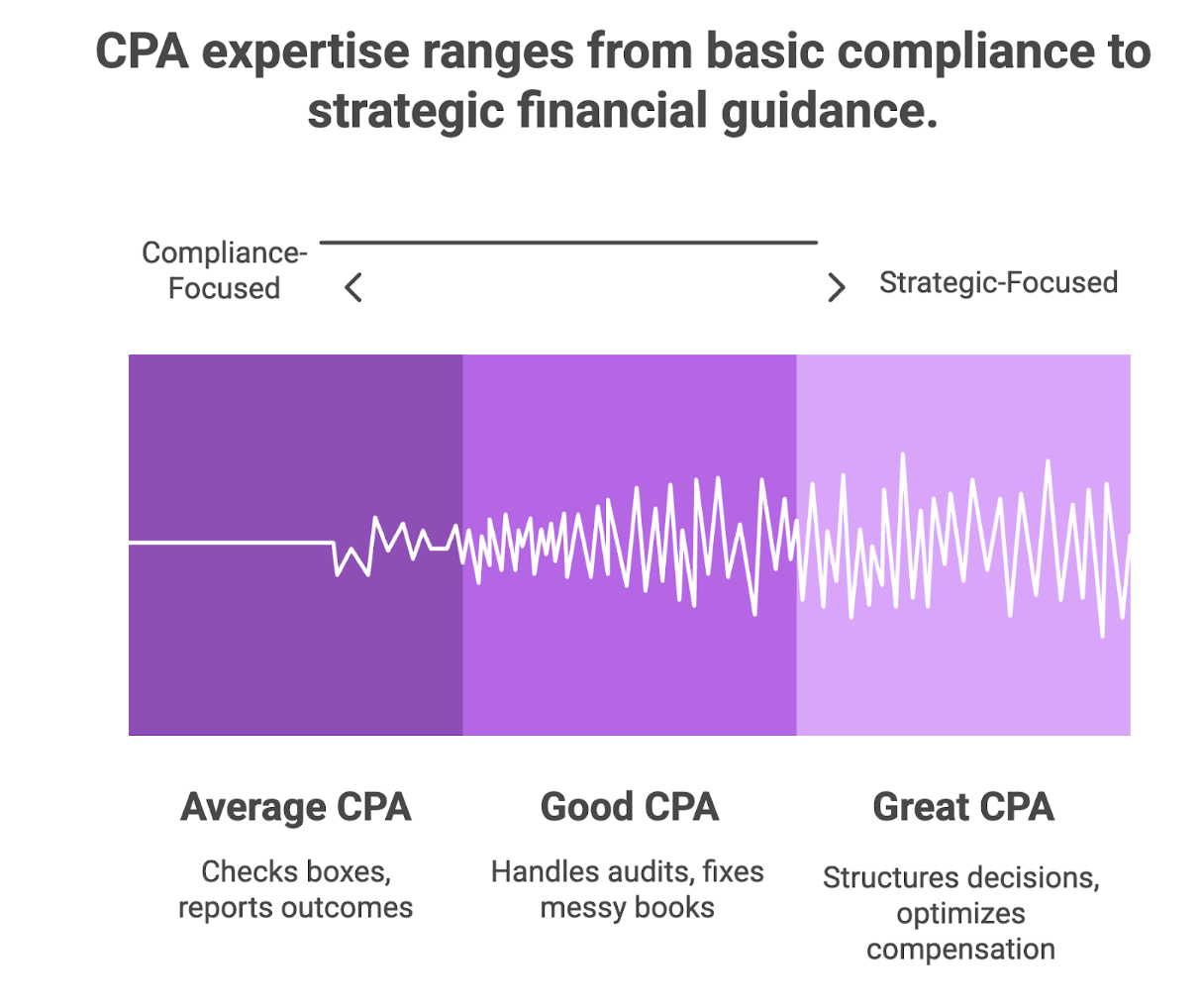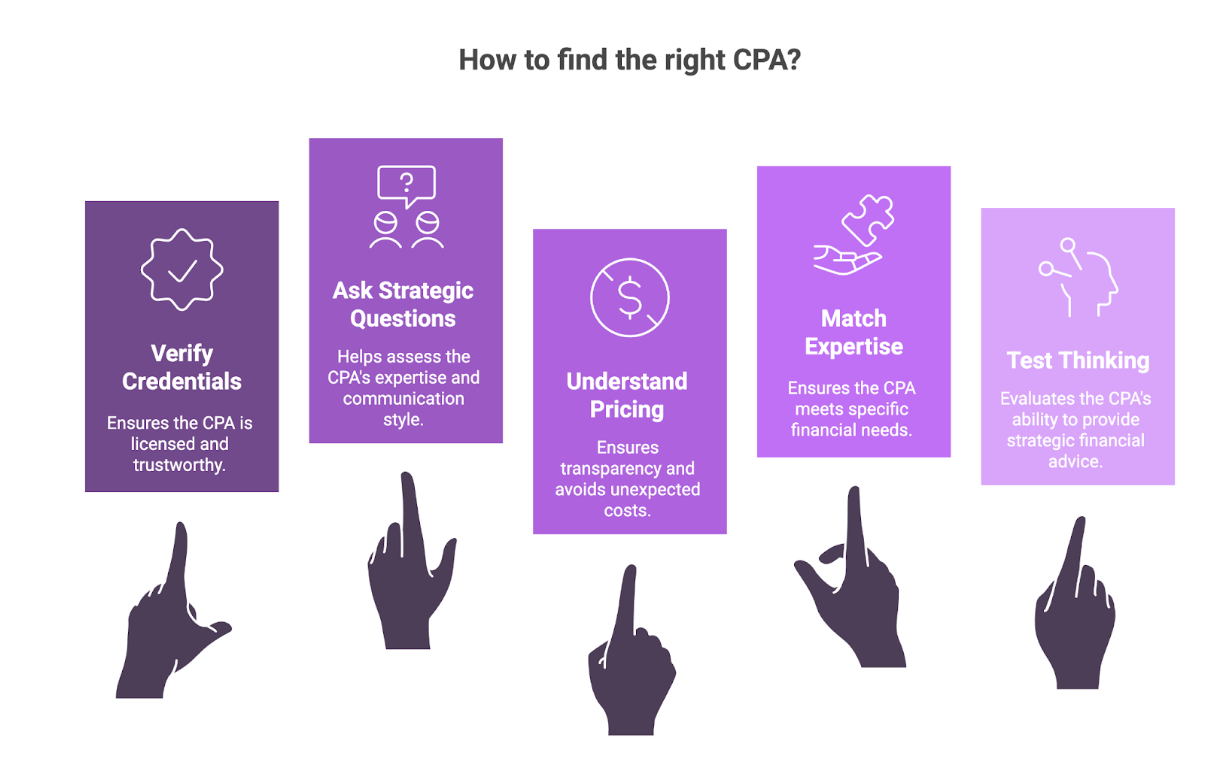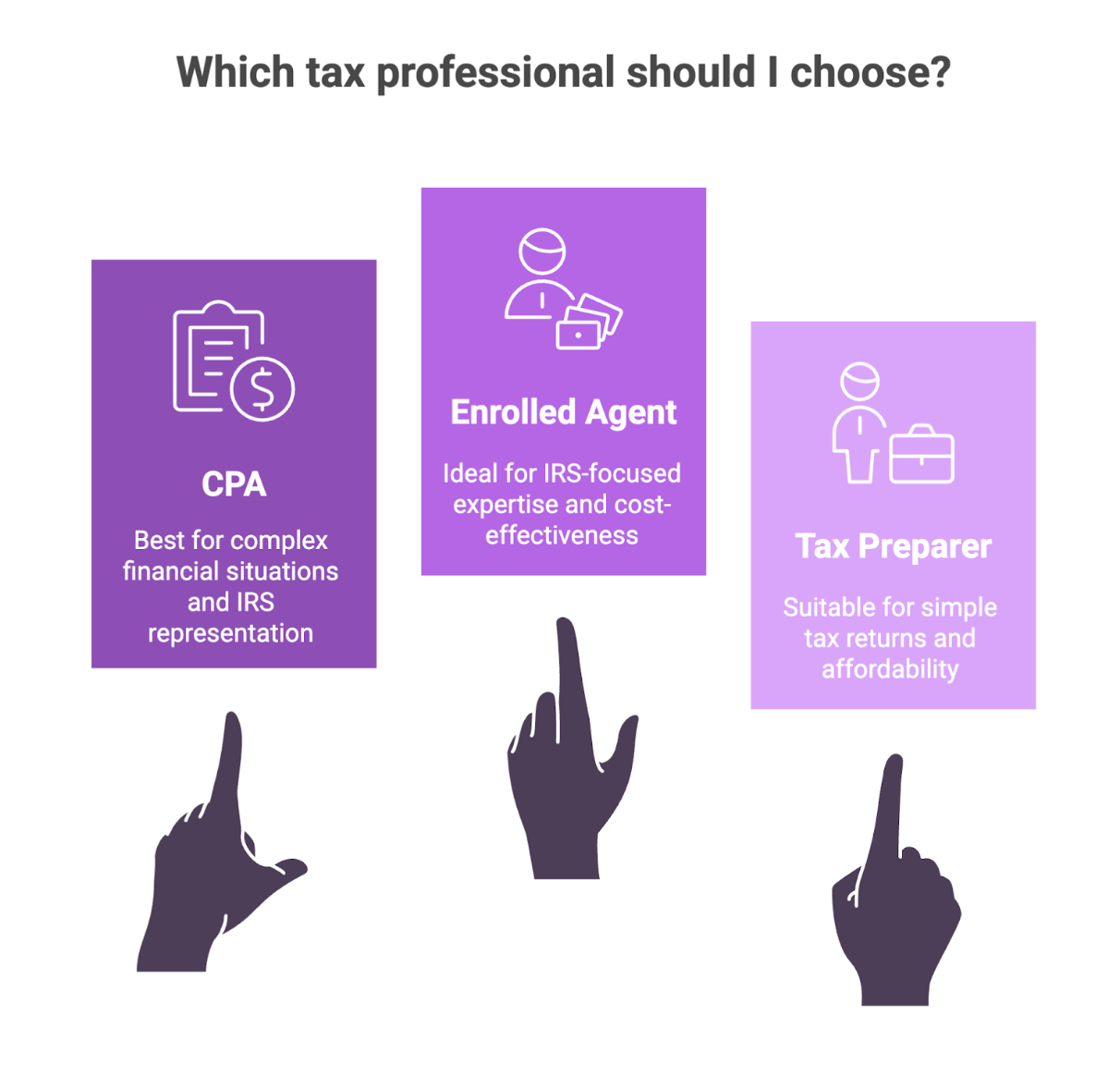Finding a good CPA isn't just about tax season, it's about peace of mind, year-round strategy, and having a trusted partner who knows your numbers better than you do.
Whether you're a solo founder, a small business owner, or someone managing complex finances, the stakes are high. One wrong hire can mean missed deductions, IRS trouble, or poor financial planning that costs you thousands down the road.
But here's the challenge: anyone can call themselves a "tax pro."
So, how do you cut through the noise and actually find a good CPA who gets your business, communicates clearly, and delivers results?
This guide breaks down exactly how to find a good CPA, from what credentials to look for, to red flags to avoid, to where to search (and how much you should expect to pay). Whether you're filing your first business return or ready to level up your financial game, this is the CPA playbook you've been waiting for.
Let's dive in.
Let's cut through the noise. Anyone can pass the uniform CPA exam and call themselves a CPA, but not everyone can protect your money, help you scale, or keep you off the IRS radar.
Here's what separates an average CPA from someone worth paying top dollar for:
A real CPA isn't just checking boxes on tax forms. They:
If your CPA isn't asking how you make money, or how your burn rate looks, they're not thinking deeply enough about your unique financial situation.
Great CPAs don't just file clean returns, they know how to:
Ask them: "Tell me about the toughest client situation you've handled. What went wrong, and how'd you fix it?"
A good CPA won't just nod and take your word for it. They'll push back when needed:
If they say yes to everything, they're either inexperienced or scared to lose your business.
A solid CPA builds tax strategy, not just compliance. That includes:
If your CPA isn't proactive between January and October, you're missing most of the value.
A strong CPA respects your time. They:
If you're chasing them for basic info, or emailing Excel files back and forth… it's 2025, not 2009.
Want the real test?
Call 3 CPAs. Ask them how they'd structure your taxes over the next 3 years. The average one talks in forms. The great one talks tradeoffs.

When you're looking for a new CPA, you're not just hiring someone to do your taxes, you're choosing a financial partner. Whether you're self-employed, managing rental properties, or running a business, the right CPA can save you thousands and help you make smarter money moves year-round. But how do you find one who's actually good, not just certified?
Here's how to do it the right way.
Don't fall for the first listing that shows up on Google. Instead, head to your state's Board of Accountancy or the AICPA directory to verify licensed CPAs in your area. These platforms let you check credentials and select qualifications, licensing status, and even disciplinary history.
Many directories allow you to filter by location and help you filter results based on your specific business needs. If you want someone who truly understands your specific tax situation, whether it's startups, real estate, or international taxes, look for CPA firms that specialize in your niche.
For example, if you're an early-stage founder, Madras Accountancy, which supports U.S.-based startups with outsourced CPA services, might offer far more relevant help than a generalist.
Too many people stop at "Do you handle simple form 1040 returns?" or "What's your rate?" A better approach is to treat this like a vetting interview when choosing a tax professional. Ask:
"What kind of clients do you typically work with?" Their answer will tell you if they're used to handling cases like yours or if you'll be the exception.
"Can you walk me through how you'd help someone in my situation save money?" You're not just looking for form fillers, you want strategic thinkers who can optimize your finances.
"How do you prefer to communicate, and how often?" If their style is "Email me once a year," and you need hands-on help, it's a mismatch.
A qualified CPA will be upfront about how they price their services, whether they charge flat fees, hourly rates, or monthly retainers. They'll explain what's included (like tax preparation, estimated tax planning, or audit support) and what will cost extra.
Red flags to watch for:
Transparency is a signal of trustworthiness. So is a clear scope of work.
Not every taxpayer needs a top-tier CPA. If you're a W-2 employee with a simple return, a tax preparer or Enrolled Agent might be more cost-effective. But if you're self-employed, own a small business, or have complex deductions, a CPA is almost always worth the investment.
Consider your area of expertise needs:
For instance, if you're running an LLC taxed as an S corp, dealing with quarterly filings, or navigating multi-state income, you'll need a CPA who understands your entity type and filing requirements inside and out.
Here's a great litmus test: ask, "If my income doubled next year, how would you help me reduce my tax burden?"
If their answer stops at "You'll be in a higher tax bracket," move on. A high-quality CPA will talk about restructuring your entity, optimizing retirement contributions, setting up a solo 401(k), or managing deductions in a way that prepares you for growth, not just survival.
When searching for a "CPA near me," consider whether you actually need a local CPA. In today's digital world, many excellent CPAs work remotely and can handle your tax return preparation just as effectively as someone based on location.
Benefits of a local CPA:
Benefits of remote CPAs:
A referral from someone you trust is often the best way to find a great CPA. Ask:
When following up on a referral, make sure to understand what made that person recommend this particular CPA and whether their needs align with yours.
Understanding the difference between various tax professionals helps you choose the right fit:
CPAs: Licensed professionals who can handle complex tax situations and represent you before the IRS
Enrolled Agents: Tax specialists certified by the IRS, often through the annual filing season program
Tax Attorneys: Legal professionals specializing in tax law and complex disputes
Federal tax return preparers with credentials: Various levels of certification and expertise
When you're looking to choose a CPA, ask these key questions:

Hiring a CPA isn't just about filing your taxes, it's about gaining peace of mind, expert guidance, and potentially saving money in the long run. But how much does a good CPA actually cost?
The short answer: It depends. Your fee will vary based on the complexity of your finances, where you live, and the services you need.
For Individuals:
For Businesses:
Complexity of your return: The more forms and schedules you need, the higher the cost. Multi-state income, rental properties, or crypto transactions all add complexity.
Your location: CPAs in high-cost cities (e.g., New York or San Francisco) typically charge more than those in smaller towns.
CPA experience and firm size: A solo CPA may charge less than a boutique firm or a large advisory practice.
Record organization: Clean, digital records save your CPA time, and you money. If your finances are disorganized, expect a surcharge.
If your taxes involve anything beyond a basic W-2 job, a CPA can be a smart investment. They'll help you stay compliant, avoid penalties, and potentially uncover savings you might miss on your own.
Many individuals and small businesses find that a good CPA pays for themselves, especially when it comes to planning, audits, or managing multiple income streams.

Choosing the right tax professional isn't just about price; it's about aligning the complexity of your financial situation with the right level of expertise. Whether you're a salaried employee with a simple W-2 or a small business owner juggling 1099s, deductions, and quarterly payments, knowing the difference between a CPA, tax preparer, and enrolled agent can save you from costly mistakes and IRS issues.
A CPA is the highest standard of tax and financial expertise in the U.S. These are licensed professionals who have passed the rigorous Uniform CPA Examination and met extensive education and experience requirements in their state. Many also pursue ongoing training and certifications.
What CPAs do:
Best for:
Key advantage: CPAs are the only tax professionals (along with attorneys and EAs) who have unlimited rights to represent clients before the IRS.
An Enrolled Agent is a tax expert certified by the IRS, not by a state board. To earn the EA title, a person must either: a) Pass a comprehensive 3-part IRS exam covering individual and business tax law, or b) Have relevant experience working at the IRS.
What EAs do:
Best for:
Key advantage: EAs often charge less than CPAs, yet still bring strong IRS-focused expertise, especially useful for compliance, back taxes, or audit support.
This is the broadest and most varied category. "Return preparer" can refer to:
Some tax preparers are registered with the IRS via a PTIN (Preparer Tax Identification Number), but that doesn't mean they're licensed or certified to represent you before the IRS.
What tax preparers do:
Best for:
Key limitation: Most tax preparers can't represent you before the IRS unless they're also a CPA, EA, or attorney.
Sometimes your current CPA no longer meets your needs. Consider looking for a new CPA if:
When working with a CPA, you should expect:
Proactive Communication: Your CPA should reach out about tax planning opportunities and deadline reminders.
Strategic Advice: Beyond just getting your taxes done, they should help you plan for future tax situations.
Availability: While CPAs are busiest during filing season, a good one will be accessible year-round for questions and planning.
Transparency: Clear communication about fees, processes, and what services are included.
For some situations, you might consider alternatives to traditional CPA services:
The key is finding a solution that will meet your needs both now and as your financial situation evolves.
Remember that a great CPA needs time to focus on strategic planning and analysis. The more organized and prepared you are with your financial records, the more time they can spend on value-added services rather than data collection and cleanup.
Choosing the right CPA isn't just a once-a-year decision. It's about finding someone who understands your financial landscape and helps you stay compliant, save money, and plan smarter. Whether you're a solo entrepreneur, a growing startup, or someone navigating complex tax scenarios, a reliable CPA is a long-term partner in your financial journey.
The right CPA for your needs will understand your unique situation, communicate clearly, and provide value beyond just tax filing. Take time to research, ask the right questions, and don't be afraid to interview multiple candidates before making your decision.
Remember, the goal isn't just to get your taxes done, it's to work with CPAs who can help you optimize your entire financial strategy.
At Madras Accountancy, we don't just file your returns, we help you make sense of your numbers, stay ahead of tax rules, and make confident decisions. From individual planning to startup-friendly bookkeeping and fractional CFO services, our team is built to support you as you grow.
Ready to find a CPA who actually fits your needs? Visit madrasaccountancy.com to get started.

A practical comparison of hiring a freelancer vs using a dedicated offshore accounting team, focusing on continuity, quality control, security, and scaling.

How CPA firms outsource payroll and 1099 work to reduce penalties and admin load, with a clean workflow for approvals, filings, and year-end reporting.

Practical do's and don'ts for CPA firms outsourcing accounting work, based on common failure points and what successful rollouts do differently.